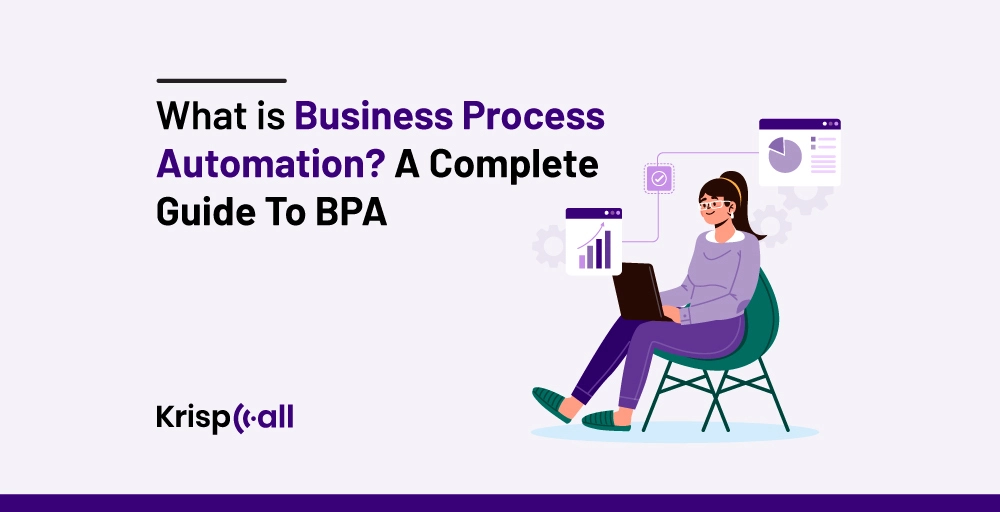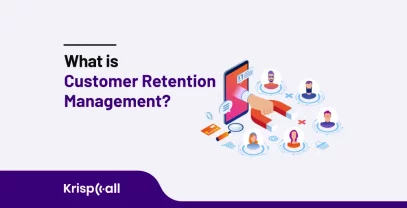Does your company experience delays or difficulties in its main processes😔? Have you been overburdened with repetitive work tasks?
If so, then Business Process Automation(BPA) can be the best way to achieve higher productivity and efficiency.
According to Analyticsinsights, 80% of companies will adopt intelligent automation by 2025. That means automating business processes is essential for the Chief Information Officers(CIOs) who want to embrace digital advances and safeguard their companies for the future.
BPA makes work easier and helps companies be more efficient and productive. But for various reasons such as implementation costs, lack of clarity, unwillingness to change, and technical issues, over 90% of automation projects fail.
In this blog, you’ll learn the definition of business process automation, types of BPA, its benefits, challenges, ways to automate business processes, what businesses you should automate, and many more.
🔑 Key Highlights
- Business Process Automation is the use of AI tools and systems that use machine learning algorithms to facilitate automated efforts.
- Workflow automation, intelligent automation, customer service automation, and task automation are some of the types of BPA.
- Increased productivity and efficiency, cost savings, and reduced errors are some of the benefits of BPA while integration complexity, scaling, and skills gap are its challenges.
- To automate business processes you should understand current existing processes, define goals and targets, identify areas for automation, make a roadmap and choose AI tools, and analyze and improve the business processes.
- KrispCall can be the perfect fit for your organization if you want to automate business calling and texting.
What is Business Process Automation?
Business Process Automation(BPA) is the use of technology to automate and streamline repetitive tasks within an organization’s business process. It involves the implementation of business process automation tools, software, and systems that help to automate repetitive tasks, improve efficiency, and enhance productivity by reducing errors. Also, BPA projects focus on identifying areas within organizations where automation can bring significant benefits.
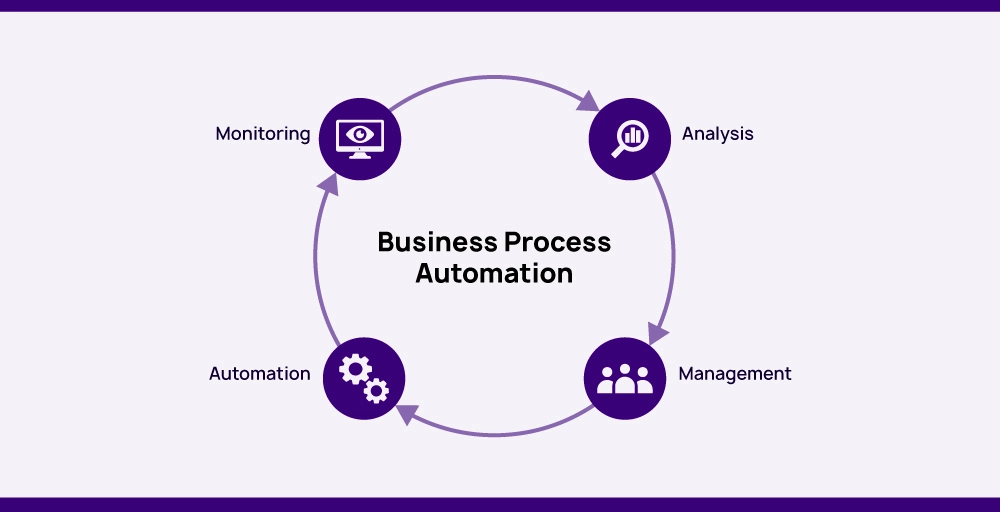
The process of business automation can be used to optimize sales processes, HR processes, marketing, training, and many more. It is an important component of digital transformation for many organizations, allowing them to streamline procedures and operate more efficiently.
What are the types of Business Process Automation?
Depending on the specific tasks and goals, BPA can be implemented in various ways. Some of the common types of BPA include:
1. Workflow automation
Workflow automation is the use of technology to simplify and automate sequential tasks within a business process. This automation helps businesses save costs and increase productivity by increasing efficiency, minimizing errors, and reducing the need for human labor.
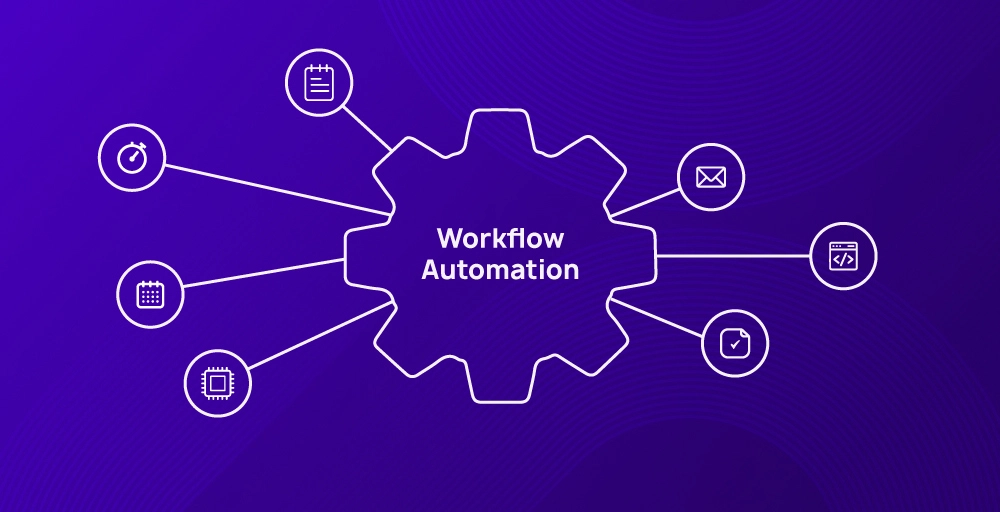
The availability of workflow automation software enables the design, implementation, and monitoring of automated workflows allowing for the effective transfer of data between various states of a process and the smooth completion of tasks.
2. Intelligent automation
The concept of intelligent automation is the combination of artificial intelligence and machine learning with automation technologies to create intelligent, self-learning systems that can adapt and evolve as they are used.
It allows one to study data, make decisions, and carry out activities independently based on knowledge that is gained via pattern recognition and data analysis. Data mining helps an entire organization make better decisions through the increased accuracy and efficiency of processes ultimately contributing to operational efficiency.
3. Customer service automation
Customer service automation uses technology to automate and optimize various aspects of customer support and service processes. Businesses can reduce human involvement requirements by implementing chatbots, IVR systems, and self-service portals to offer clients prompt and effective assistance.
Businesses may raise customer satisfaction levels, speed up response times, and improve the entire customer experience by utilizing automation.
4. Task automation
Through the application of technology, task automation automates manual and repetitive duties in a variety of workflows and processes. Organizations can eliminate human error, increase efficiency, and streamline operations by employing task automation for tasks such as data entry, file transfers, and email notification.

Usage of task automation tools and software, businesses can eliminate the need for manual involvement by automating operations when certain conditions or events occur.
Business Process Automation examples and use cases
Various corporate processes can be automated such as marketing, HR procedures, management, and operations. But in general, high-volume tasks, time-sensitive, and multi-person requires the automation processes.
Implementing a robust process automation system ensures that businesses can effectively manage and adapt their automated workflows to the changing requirements.
Some of the examples and use cases of BPA include:
HR
By automating time-consuming documentation and repetitive chores such as creating new accounts, obtaining tax information, and sending welcoming mail, HR departments may minimize errors and reduce the need for human involvement in employee onboarding.
This makes HR departments focus on more strategic projects like employee development plans, hiring tactics, and improved workplace culture making the onboarding process better and also making it possible for HR teams to make long-term contributions to the success of the company.
Customer support
The utilization of chatbots powered by business process automation in customer service offers a modern solution to answer frequently asked questions, removing the need for clients to hold time. Implementing chatbots with BPA technologies allows businesses to strengthen customer relationships by quickly and efficiently responding to frequently asked questions, offering immediate support, and enhancing the overall client experience.
Marketing
The workload of social media marketing can be minimized with the use of BPA tools as they offer services like commenting, scheduling posts, and tracking campaign results. By automating the process, marketing teams can ensure consistent and timely content delivery, engage with their audience promptly, and gain valuable insights into the effectiveness of their campaigns.
Finance
With the application of business process automation, the finance industry can automate tasks such as data entry, workflows for approval, payments, and improving overall efficiencies. Organizations can guarantee accuracy, speed up payment cycles, and improve invoice administration by automating these processes. Organizations looking to streamline invoicing can benefit from free excel invoice templates, simplifying data entry and financial processes, thereby optimizing efficiency.
What are the benefits of Business Process Automation?
Business process automation can improve the functions of the company by streamlining tasks and workflows. Some of the key benefits of implementing the BPA include:
- Increased productivity and efficiency: Repetitive tasks are automated, workflows are streamlined, and human resources are more focused on strategic initiatives. This leads to improved efficiency and productivity in overall business processes.
- Minimizing costs: BPA helps cut expenses related to employee time, mistakes, and operational inefficiencies by cutting down manual labor and optimization processes.
- Reduced errors: The amount of errors that can occur from manual data entry and other error-prone operations can be minimized with the help of automation, which leads to fewer mistakes and better data accuracy.
- Improved customer service: Automated processes enable faster responses to customer inquiries, requests, and market changes, resulting in happier and more loyal customers.
Even with all BPA’s benefits, not every process is suitable for automation. BPA is best suited to high-volume tasks, repetitive nature, and time-sensitivity. Also, automation is a continuous process; businesses should regularly assess how modifications to security, governance requirements, and other factors may affect automated processes.
Some of the challenges that BPA may face are:
- Integration complexity: Sometimes, integrating BPA tools and systems with current infrastructures and legacy systems might take a lot of effort and time.
- Scaling: In terms of system performance and resource allocation, scaling BPA efforts to meet growth and changing business needs may pose challenges.
- Insufficient documentation: Step-by-step procedures that are clearly documented must be provided with BPA tools. Before using BPA, a company not having the necessary documents would need to go past this obstacle.
- Skills gap: Resource restrictions and skill shortages may result from an organization’s lack of specialized knowledge and experience needed to implement and manage BPA tools.
What Business Process should you automate?
Various factors like specific requirements and objectives of the company, the nature of the sector, and the available resources play a crucial role in determining which business operations should be automated. However, some of the factors in determining which operations are to be automated:
- Repetitive and high volume: Check for the tasks that are performed frequently especially when they involve processing large volumes of data. As these jobs consume a lot of time and are frequently prone to errors when completed by hand so they are the prime candidate for automation.
- Time-sensitive tasks: To increase responsiveness and speed up task completion, processes with strict deadlines or that need to be completed quickly might be automated.
- Multi-step processes: An automated business process can be a good fit for businesses if it consists of several phases and hand-offs between various people.
How to automate business processes?
Automating business processes involves a better understanding of a process and having access to solutions that can make automation a reality. This includes applying business process management methodologies to efficiently optimize and execute an automated BPA solution to your organization’s needs. If you are ready to automate business processes, here’s a breakdown of how you can put them into action:
- Understand your current processes: Start by doing a comprehensive analysis of your current business process. This involves outlining the procedure, identifying which employee is responsible for which tasks, and discovering any inefficiencies.
- Define goals and targets: Identify what you are going to accomplish using automation whether it is lower costs, better accuracy, or higher efficiency. Setting measurable goals leads you to monitor your progress such as processing time, error rates, and customer satisfaction.
- Identify areas for automation: Not all tasks are automated, identify the areas that are fit for automation. Repetitive tasks, multi-step processes, time-sensitive actions, and compliance-driven actions are some of the tasks that can be automated.
- Make a roadmap and choose tools: Plan the whole automation process such as prioritizing tasks, allocating resources, and setting timelines. Also, make sure to choose the BPA tools that perfectly fit your organization for complex workflows or simpler solutions.
- Implementation and training: Integrate the selected tools to your existing systems that may involve data migration and system configuration. Also, educate your employees on the new automated processes. Describe to them how the automation works and how it affects their roles.
- Analyze and improve: Analyze how well your automated processes are working. Utilize the measurements you set up earlier to evaluate your progress and pinpoint the areas for improvement. Always be ready to modify and improve your automation plan as necessary.
Automate Business Calling & Texting with KrispCall
In recent days it has been difficult for businesses to handle a large amount of calls and texts at once. They are in the process of automating their business. There are various tools and software available in the market that help you to automate your business processes. KrispCall is one of the rising platforms in the VoIP industry to automate your business calling and texting.
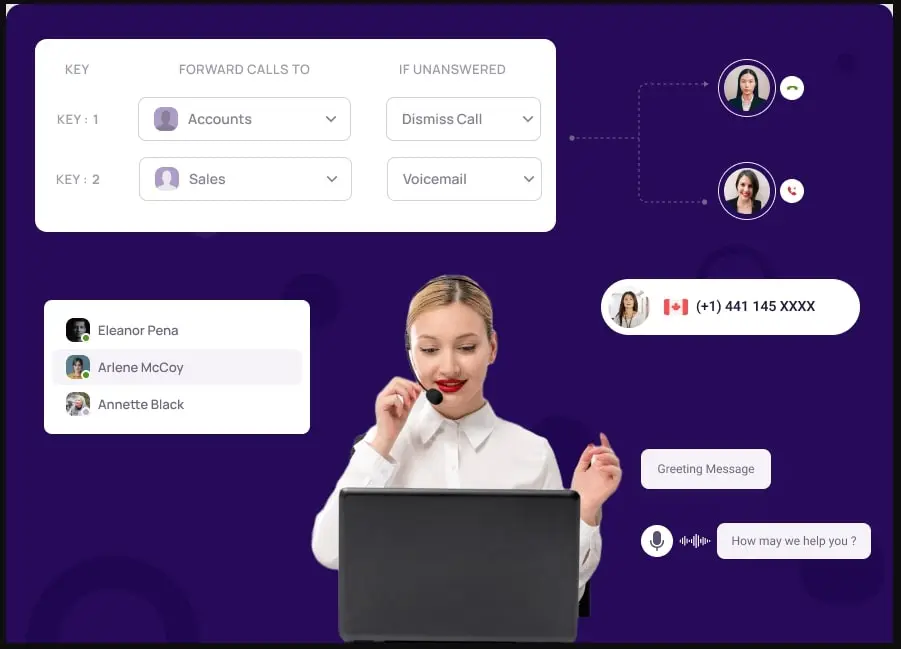
KrispCall stands out as the best platform thanks to its advanced features such as call recording, call transfer, call analytics, IVR, and multiple phone numbers. KrispCall offers features that can automate business calling and texting but it is also important to understand it won’t fully replace manual interactions.
KrispCall’s automation features
- Power dialer: The KrispCall power dialer helps to automate the process of dialing multiple numbers at the same time. Agents do not have to dial each one individually.
- Automatic call distribution: Route the incoming calls to the most qualified agents available. Use the valuable insights to optimize your operations.
- Voicemail transcription: Instantly convert voice messages to text, quickly review key details, and prioritize your communications.
You can also connect KrispCall to over 3,000 other apps through Zapier, a service that integrates with KrispCall. With this feature, you can automate workflows based on call events, such as adding new leads to your CRM system after a call comes in or sending follow-up emails after a call.
Try Automating Business Calls & Text Now With KrispCall!
Wrapping Up!
Business Process Automation is a valuable tool 😊 for businesses looking to streamline processes, increase productivity, and empower employees. As BPA evolves alongside advanced artificial intelligence and other developing technologies, its impact on future work is increasing.
If you are looking to automate business calling and texting. In that case, KrispCall can be your organization’s best option 🤩 as it offers various features such as a power dialer, automated call routing, automated SMS, IVR, call recording, and many more.
FAQs
What is the difference between Robotic Process Automation(RPA) and Business Process Automation(BPA)?
The difference between Robotic Process Automation and Business Process Automation include:
| RPA | BPA |
| It focuses on repetitive tasks such as data entry, form filling, or email sending that follow a clear set of rules. | It focuses on automating entire business processes which may involve multiple tasks or departments. |
| It functions as a digital assistant, simulating human behavior with existing business processes. | It takes a more strategic approach, analyzing, and redesigning workflows for increased efficiency. |
| RPA software often integrates with existing BPA software to automate particular steps within the bigger process. | BPA software integrates RPA but also has a broader range of functionalities from overall workflow management. |
Is ERP a business process automation?
Yes, ERP is a form of business process automation as it is a powerful tool that not only automates tasks but also incorporates BPA functionalities into its core processes.
What are some of the future trends and technologies in the field of Business Process Automation?
Some of the future trends and technologies in the field of Business Process Automation include:
- The rise of Intelligent Automation(IA)
- Hyperautomation
- Low code/No code platforms
- Customer Centric Automation
- Process mining

